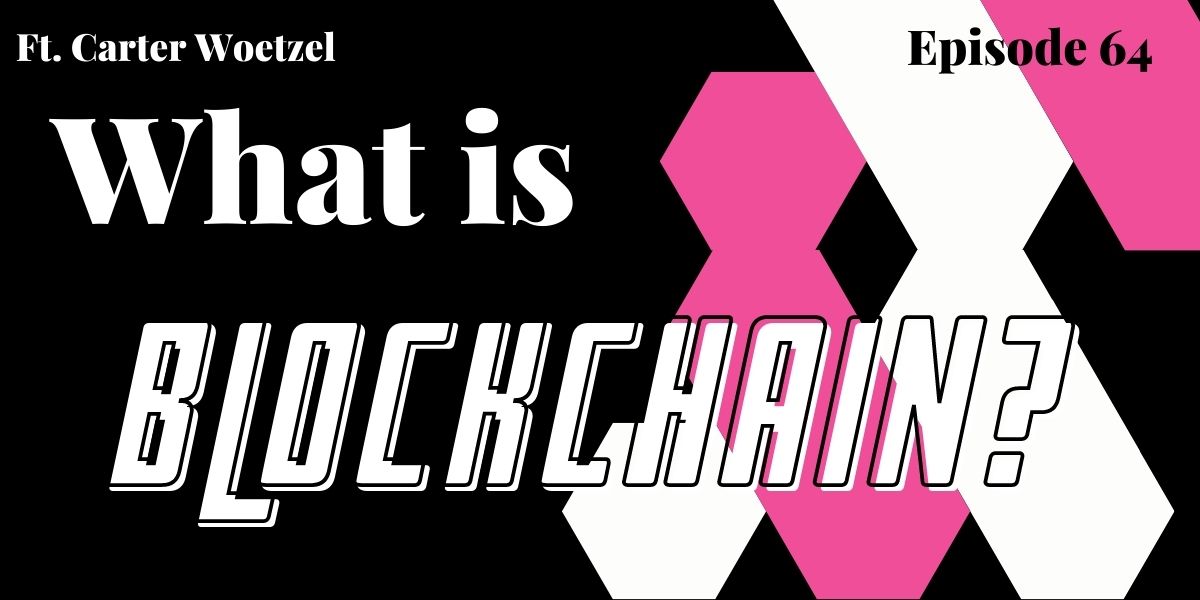Wow! Get ready for your mind to explode because Carter Woetzel helps us imagine the future of technology and the answer is blockchain! If you’re completely new to the topic, this expert is about to break it down into bite-size chunks. You’re about to get an idea of where the future of the internet is headed. We cannot say enough about how much fun we had on this episode, and you’re going to hear it!
Bekkah: Okay, Carter Woetzel is with us today. He actually wrote a book all about this so I’m super excited to talk with him! Thanks so much for being with us today!
Carter: Yeah, absolutely! Pleasure’s all mine. Always happy to come and chat about all the tech things and do the best we can to try to explain it to everyday people. It’s where my heart’s at just educating people and whatnot.
Ruthie: That’s awesome!
What Do You Do In Blockchain as an Entrepreneur?
Bekkah: Yeah, so the first question we have for you is what exactly do you do?
Carter: Yes, so I am in an interesting stage of life because I am a senior in college so I’m graduating with a computer science and finance degree. I have a startup. The name of the startup is Secure Secrets. What we do is we run a lot of different nodes and servers that essentially run the transactions that allow cryptocurrency to work. We’re the underlying infrastructure. We’re part of that layer that allows all of this magical stuff, bitcoin, all the stuff you guys have heard about. We’re on actual servers and that’s how we make the money. The big bucks!
Ruthie: Wow! Okay, so tell us a story. Why do you do that? What’s your story behind that?
Carter: Yeah, so this journey for me really started back in 2017. I had a cousin, Garrett Woetzel, kind of reach out to me about this technology, this cryptocurrency called bitcoin way back then. It immediately really appealed to me. The idea of a currency that you know didn’t have a centralized authority. It was like this decentralized community of people where we can exchange peer-to-peer without a centralized intermediary.
As someone who believes that the ability to spend money is a form of freedom of speech in and of itself, I just got sucked into the community. It’s at the crossroads of economics, computer science, game theory. The subject matter itself just fascinated me and from there I read a lot of – to be honest – bad literature. Like there weren’t a lot of well-written books out there. So in the process of educating myself on blockchain, I realized I was writing a book.
I was actually taking notes for myself and I’m like, “Oh, I have 50 pages of notes. This is a book.” I ended up writing a book. That was a three-year journey and in the process of writing that book met a lot of amazing people and that’s how I ended up meeting my co-founder. Well, he’s the founder. I’m the co-founder and his name’s Mohammed Patla. He goes to the University of Toronto. That’s how we ended up meeting each other and we decided to spin up the business together starting in June of 2020.
Bekkah: Wow! There are so many things going on in this. I would agree with you, back when blockchain started becoming really exciting I remember being like what exactly is this and I did a bunch of research on it and it was so confusing. I felt like I was talking to somebody that either was intellectually far beyond me or just not good at communicating.
Carter: Yeah, yup, yup yup.
How Does Blockchain Work Today?
Bekkah: The next question we have for you is what does that mean today for going through the technology? How does it work?
Carter: Yeah, so I always like to kind of start with the problem because if I give the definition of blockchain and I give the whole like, “Oh, this is what it is!” It doesn’t really mean anything, right? So I’ll start with the problem. When you go to the gas station and you pull out your credit card and you purchase a Diet Coke, for instance. A lot of people don’t realize that there’s a lot of different steps in between.
There’s trust that has to happen between you and the person at the counter. There’s this intermediary where the credit card has to essentially reconcile ledgers between banks, between different organizations and so something that people think is a peer-to-peer transaction isn’t actually peer-to-peer. There are all these different individuals in the middle that are taking away value. They’re kind of taking a little portion of it. So the question that blockchain is all about is “Can we have peer-to-peer transactions without an intermediary,” right? That’s kind of what blockchain is.
It’s this network of nodes, different devices, everyone’s interconnected and we all share the same set of rules. Everyone shares the same exact ledger. Every single person can all see these different transactions going on and it makes it super difficult to game. It makes it super safe and it allows me to transact with you without a bunch of different intermediaries in the middle. That’s kind of what blockchain is; it’s this big set of rules that allows everyone to transact fairly without that centralized intermediary.
Who Invented Blockchain and How Was It Originally Created?
Ruthie: Okay, so that’s kind of the basic premise of it and, honestly, I’m hearing you say all these things and I’m like “Wow!” I think every single person who listens to this podcast is going to have to listen to like 10 episodes of your podcast to wrap their head around this but who originally invented blockchain? How was that created?
Carter: Yeah! It’s funny, writing the book, a lot of people think cryptocurrency, “Oh, bitcoin!” Like right after the 2008 financial crisis, there was this anonymous person named Satoshi Nakamoto that posted this paper that pretty much outlined bitcoin. It outlined a way for us to change currency forever, to potentially break away from the broken banking system in some capacity and let people and decentralized communities retake control of currency. But what people don’t know is that the ideas of blockchain have actually existed since 1970.
There is a professor from Berkeley named David Chaum and he outlined every single component of blockchain, like the actual moving technology components except one individual component that Satoshi Nakamoto in 2008 essentially solved. It has to do with this consensus programming mechanism so that people can’t game it. I’m not going to go into the details there but the ideas have existed for over 50 years but the actual implementation and use of it has only been around for about a decade now. It’s older than people think but wildly young in the grand scheme of tech and currency.
Why Do People Want to Use Blockchain?
Bekkah: Yeah so why do people want to use blockchain over other things? I think you answered a little bit but could you give us an example of how people use it now?
Carter: So in terms of where people are actually using it, I’ve actually done over 800 transactions on a big range of blockchain. For me, using cryptocurrency is actually more familiar than using like Venmo. Right now in my browser, on my Chrome Browser, I have a cryptocurrency wallet. On my phone, I have a wallet and it looks no different than Venmo does. The difference is that with cryptocurrency and blockchain there are all these different apps that are being developed.
All these different decentralized apps are created. For instance, right now there’s decentralized lending. I can essentially take out a collateralized loan, no paperwork, all you need is an internet connection. Totally permissionless. Anyone in the world globally can interact with all these different apps out there. There are decentralized exchanges. We have people from Venezuela, Iraq, the United States, everyone globally interacting with each other on these essentially protocols and these exchanges built on top of the blockchain technology and it’s all permissionless. It’s all kind of free entry for anyone.
How Do Loans Work Through Blockchain If It’s Anonymous?
Bekkah: Okay, so let’s just say you did get a loan through blockchain? How are you responsible for paying that back and how do people keep you accountable if there are no stops to letting you take that out?
Carter: Yeah, so right now the whole system because it’s a collateralized loan, you’re technically putting up more collateral than the loan you take. Which is part of the limitations right now. We’re exploring what it means to come up with a decentralized, credit scoring system. How do you have accountability wrapped up in these systems with people that you’ve never met before? These are really big challenges and it’s part of the reason that the central banking system and banks are super helpful tools. They do provide a layer of accountability.
The question is “Is there an alternative? Is it feasible?” and what we’re discovering is that it actually is. Decentralized lending, decentralized finance, there are all these different tools that are being built out that are wildly valuable. They kind of mimic a lot of these different exchanges, options, trading. A lot of different trading-related stuff that we can do without kind of a centralized exchange. For the everyday layman, there’s over – right now we’re at about 70,000 different vendors including Microsoft, Expedia, AT&T. They’re accepting cryptocurrency as an option.
We’re seeing more and more vendors globally accept it. Straight up as a currency, it’s becoming more usable, more valuable, and a lot of people don’t know just how rapidly merchants are starting to onboard cryptocurrencies as an option. So yeah. There are lots of different fun use cases out there but those are the two big ones I like to talk about is: currency and decentralized finance are the fun ones without going too deep in the weeds.
How Is Blockchain Connected to The Stock Market?
Ruthie: Then how does all of this tie into the stock market?
Cater: Yeah so I think it’s really interesting in that a lot of these different cryptocurrencies, they’re not like firmly attached to a sovereign nation. Companies that exist within the stock market are attached to the US economy, right? They’re attacked to you know the ebbs and flows of the economy based off of inflation, based off of federal reserve, based off of different legislation and regulation. Whereas, something like bitcoin and these different cryptocurrencies because they’re decentralized and neutral they’re kind of a hedge against sovereign economies in some way.
It’s part of the reason we’ve seen bitcoin skyrocket from five thousand dollars, twenty thousand dollars, fifty thousand dollars where it kind of stands today is more and more institutional investors including the Tesla’s of the world are putting bitcoin on their balance sheet because it’s a hedge against crazy inflation in the United States. One thing people don’t know about is that for the longest of time economies of scale have driven prices down on products quicker than inflation.
What that means is we don’t really feel the impacts of inflation on our everyday goods because technology, factories, all of that we’ve made prices cheaper and cheaper and cheaper. But, in the 21st century, we’re starting to come to a point where economies of scale are slowing down in manufacturing, and guess what that means? It means every day people are beginning to feel inflation big time. It’s not sustainable. The federal reserve can’t just print six trillion dollars and not have everyday people be deeply impacted and that’s what bitcoin is, it’s a hedge against inflation of massive sovereign nations globally.
Bekkah: Wow! There’s so much in there I’m just so excited about!
Carter: And I apologize like this, it’s always funny, this could be my gawk, it’s not time for the gawk story but the number of times I’ll be like – there’s one time I was at Taco Bell with some friends and people in a parking lot. It was really random but like we’re eating our Taco Bell. We’re having a good time and someone’s like, “So, Carter! What’s – I heard you wrote a book. Like what’s blockchain?” And the whole room was just like completely silent. And I was like, “No, like that takes like 30 minutes to an hour I can’t just like sprint through that for you, but I try and that’s what a podcast is, right? It’s the best attempt to not like sit down and with paper and pencil draw out things because sometimes that’s what it takes.
How Has Technology Changed With Blockchain?
Bekkah: Yeah so how have you seen technology change since you started working with blockchain?
Carter: The biggest change is that we’re finally seeing products come live. Back in 2014, 2015 there was this massive community of capital and investors that were excited about cryptocurrency. They were excited about “smart contracts.” Which is like a whole different discussion of a – how do I say this not a transaction layer. A settlement layer I won’t go into detail there but long story short back then wildly smart people were writing these papers called “white papers.”
They would outline different protocols, different products, and people were just kind of throwing money at these people like millions and millions of dollars and there was no product. Which is not good by the way! That’s really not how businesses should be started in my opinion. I think products should be built first and capital should come later. But now in 2020, 2021 we’re seeing these research projects that sat there for five or six years finally launch and have real products and have users jump on board and start to use them. That’s the biggest difference that we’re seeing.
There are so many developers and builders and the cool part too is we’re seeing the best talent in the world enter into this domain. I get to work with some of the most brilliant people. People from MIT people from Berkeley. People love this decentralized movement. They love the ethos behind it. It’s like, “What am I going to do? Am I going to go work for Amazon?” This potentially soul-less company or am I going to go work in this very exciting startup community of collaborative people trying to build a better world of finance; this open, permissionless system globally. Yeah, the people are great!
How to Start Using Blockchain
Ruthie: Okay, so in keeping with the topic of people how – it’s just really easy to have this ethereal idea of like, “Oh,yeah that’d be really cool but I could never participate in that.” How do people get involved with blockchain and how does one get a blockchain for themselves? What does that look like?
Carter: Yeah so I think the easiest first step is, in some ways you do have to purchase the cryptocurrency in some capacity. There’s a lot of different exchanges out there and it’s just like you link a bank account to an exchange and once you get the cryptocurrency itself and you send it over to your wallet on your phone or your laptop then this whole world of decentralized products open up to you. One of the problems we’re still trying to solve is this onboarding process to get people from US dollars to having cryptocurrencies and doing all this fun stuff.
That process is still very centralized. It’s a big problem but for every day people, you can essentially buy it and find out which communities are building interesting tools. Like a really cool one with Ethereum, they have something called NFTs. Essentially where artists are starting to move their art onto blockchain and what that does is you can have provable, scarce, digital art. Like today there was a Wall Street article someone sold a piece of art for 62 million dollars. A piece of digital art for 62 million dollars. There’s this entire art community that’s being sprung up on certain black chains.
We have different music communities that are starting to be sprung up and it’s all around this idea of decentralized ownership and it’s about permissionless participation. Compared to these every day – like can we have a Spotify without having a single Spotify company like stealing all the revenue. Can we empower individuals, replacing the company with a program that’s perfectly fair, perfectly neutral, that everyone can interact with permissionlessly.
Honestly, I lost track of the question in that train of thought. Well, you’re saying how do you find different things you’re interested in. It just takes a little bit of research. There are different people who are using it for gaming platforms or super fun. There are all sorts of different things.
How Does Someone Sell Digital Products Using Blockchain?
Bekkah: Let me just like try to visualize what you’re saying, okay? Repeat things to you, so you’re saying that someone can take, let’s just say I design something on like Procreate or Canva or whatever I make some piece of art. Then I upload it to blockchain and say this is for sale?
Carter: Pretty much. Yeah, and the thing is we have apps and websites no different than like we use every day on the internet. The back end is interacting with the blockchain but like when you’re on a web page looking and uploading your art to a website to sell it to other people, that looks like a totally normal user experience, right? No different than browsing on Amazon or Facebook or what have you. The front ends look totally normal. It’s the stuff that’s happening in the background that’s being swapped out that brings blockchain into the picture as this decentralized intermediary instead of a centralized server website.
Bekkah: Okay, okay, so then what I’m hearing from that is it’s basically like a separate internet?
Carter: Yes. We call it Web 3.0 because we want to build a world where we empower individuals and we remove the middleman. A lot of technologies that get created automate away the little guy but blockchain automates away the big guy. We get rid of the big guy and we allow everyone else to be empowered to interact with each other directly on these platforms. Which is crazy by the way! That’s why a lot of big players don’t like it because it represents an existential threat in some ways to the power dynamic that kind of exists out there.
These Are The Programming Languages to Know to Get Into Blockchain
Bekkah: Okay so are there any specific programming languages or math – what would someone need to know to get started if they were going to say, “I want to do blockchain for myself”?
Carter: In terms of being a developer or a user or what, what, what do you mean by that question?
Bekkah: Ruthie can tell you what we mean by that.
Ruthie: Well, like what kind of programming language is used to manage the blockchain platform? Like Javascript or how does it even work to program it?
Carter: Yeah so like I said before we have your traditional front ends. You can do HTML, Javascript, CSS, (no idea what he said here…) whatever the heck you want your front end to look like, and then you pretty much have your Javascript interact with like an API that’s attached to a blockchain. Yeah, front-end skills are still wildly valuable. The people that are modifying the protocols themselves like these blockchain protocols or making that back-end infrastructure, there’s a lot of different languages out there. Rust is the one that’s super in demand like if you can program and Rust you will be instantly hired in the blockchain domain for like 200k + right now. Like straight up. So Python’s good too. There’s a lot of data analytics-related work that’s happening as well. So yeah. Python and Rust those and Javascript.
What Personality Thrives While Working with Blockchain?
Ruthie: Okay, well, you can clearly tell that we don’t know a lot about this so we’re asking questions that hopefully, other people would wonder too. But tell us about like the kind of people – because you said that you love the community surrounding blockchain. What kind of personalities really excel in getting involved with blockchain?
Carter: That’s a fantastic question. I’ve found – the community I’m specifically a part of is privacy-focused and I’ve found that attracts a certain kind of individual but what I found collectively is that people are just so open to collaborating and creating. In a typical small business, you’re immediately in “I’m a competitive environment. I’m in a competitive environment. How do I have a better product? How do I beat people to market? How do I draw customers in?” It’s this very – right from the get-go it’s like a competitive mindset.
In the blockchain space because we’re so early people work with competitors because it’s like are we going to fight over the individual piece of the pie are we going to all grow the pie together? Because if we all grow the pie together then we all win. I straight up have people that are doing the same thing my business is doing and we collaborate all the time. We technically compete on customers but if us working together means our ecosystem gets a hundred thousand new customers or like users then that’s a hundred times better than competing over the thousand customers that are there right now. That’s totally counter-intuitive I think to traditional businesses. This collaborative, decentralized movement. It’s totally mind-blowing in my mind to see people work together like that.
Ruthie: It seems like a pretty foreign concept too. That’s not really – that’s definitely an anomaly in the market.
Carter: Absolutely, yep.
Bekkah: Yeah so tell us where can people find you to hear more about all of these things that you’re doing?
Carter: Yeah I mean a good place is Twitter I got like over a thousand followers on Twitter so that’s the good spot. I tweet out a lot. You can follow Secure Secrets on Youtube it’s a pretty early youtube and a lot of people follow that it’s a very specific niche. But yeah Carter Woetzel Twitter, LinkedIn whatever have you. I would highly recommend getting my book too because I promise you the book simplifies. It’s part of the reason I love writing is that you can really, really drill down exactly into how you want to explain things.
I spent like three years simplifying those first four or five chapters so much so if what I’m hearing sounds totally out there but like you can catch my excitement and you can catch the fact that there’s something new and something game-changing I would highly recommend getting my book “Building Confidence in Blockchain: Investing in Cryptocurrency in a Decentralized Future.” I walk through it from the very beginning and I’ll build you up to the very end and everyone that’s read so far loves it. I’ve had people read it that barely use computers and they’ve really enjoyed it, the book from start to finish so it works for everyone.
Ruthie: Awesome!
If you enjoyed this episode of our podcast, you should send it to a friend who you think would enjoy it!




